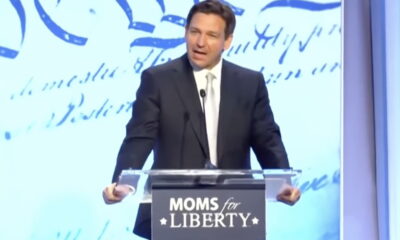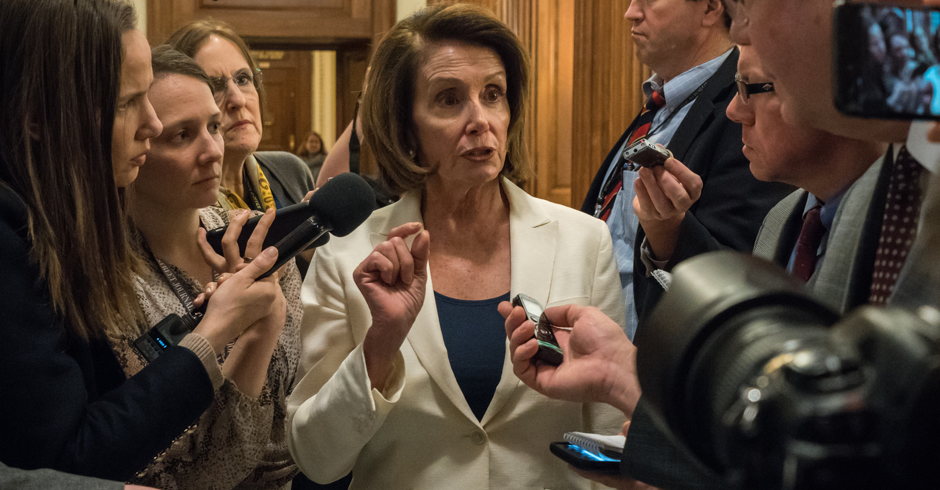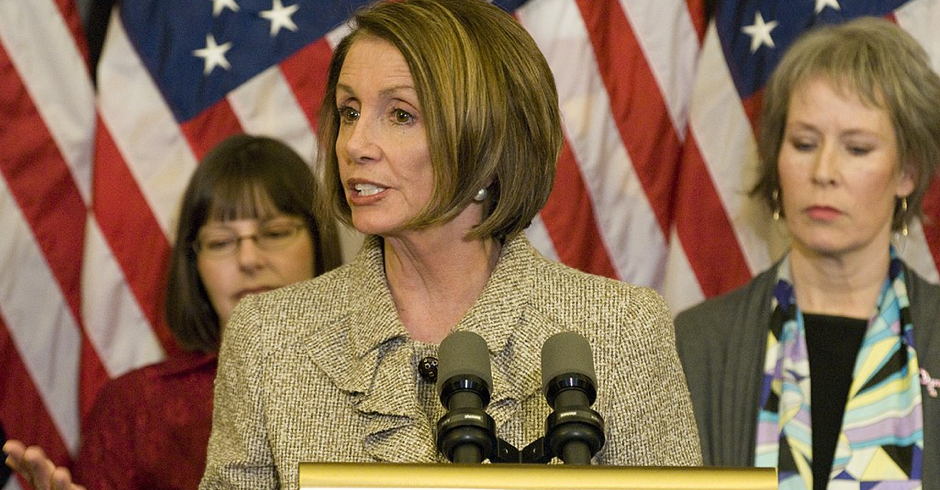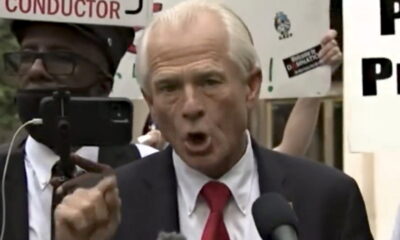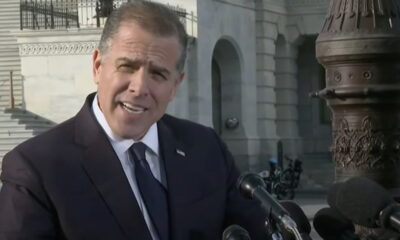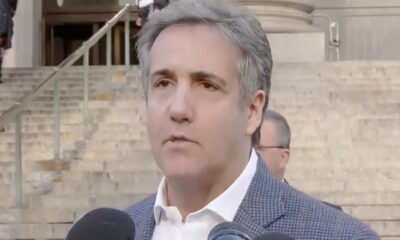Op-Ed
Which Is Worse? Trump’s Embrace of the Far Christian Right or the Far Christian Right’s Embrace of Trump?
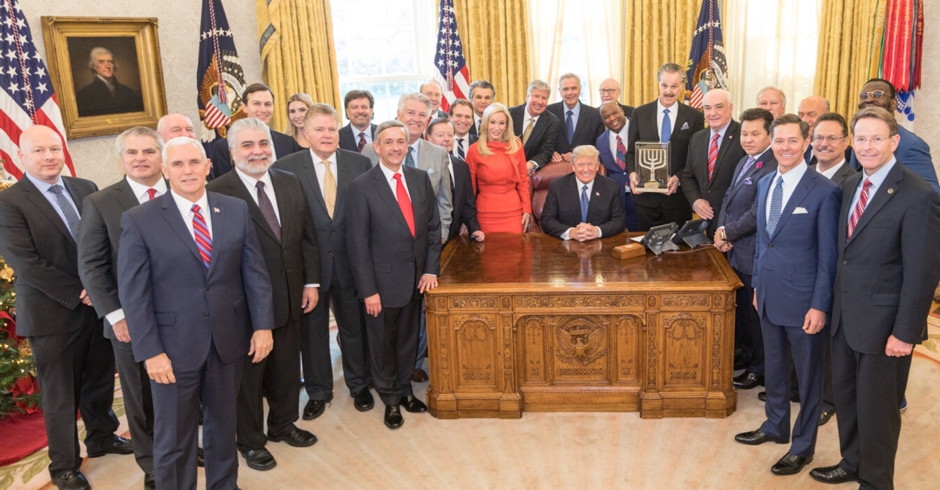
Trump’s Relationship with Evangelicals is Mutually Parasitic
Recently The Family Research Council announced Tony Perkins has been appointed as a commissioner of the U.S. Commission on International Religious Freedom (USCIRF) and the Internet promptly and appropriately lost its mind. The Human Rights Campaign immediately condemned the appointment and Perkins himself as “notoriously anti-gay.” Media Matters similarly raised alarm bells documenting Perkins’ long, grotesque history of antigay activism, including his support for conversion therapy to “cure” gayness and linking of homosexuality with pedophilia. Their criticism is not hyperbole. Tony Perkins has been a reliably hateful opponent of equality for decades. The things that earn HRC and Media Matter’s consternation, however, make Perkins a hero and celebrity among politically conservative Evangelicals. President Trump needs to keep his ties with that brand of Evangelical strong, so his patronage makes perfect political sense.
Like oxpeckers on hippos, the Trump Administration and religious right share a symbiotic relationship. President Trump owes the Family Research Council and like minded groups because they promise to turn out the base. They are also willing to suspend decades of advocacy for Christian morality in public life in return for conservative judges and continued attacks on perceived enemies of conservative Christians.
It is clear why President Trump would reward a man like Perkins with such a position. It is less clear why a leader of the religious right would seek such a reward. The Commission itself ostensibly serves a valuable purpose: advising the President, Secretary of State and Senate on how best to encourage religious freedom abroad. It rightly characterizes religious freedom as the absence of state coercion in regards to living one’s personal conscience, a necessary ingredient for any democracy to flourish. But, like so many other appointees of the Trump Administration, Perkins’ appointment follows a larger pattern of placing people in governmental roles to actively undermine the purpose and function of that role.
In his acceptance speech, Perkins provides two clues into what he gets out of such a position. He praised the 21st Century Wilberforce Initiative as a model for advocating religious freedom abroad and endorsed the Frank R. Wolf International Religious Freedom Act. Like the commission to which he is appointed, the Wilberforce Initiative does amazing work to protect conscience minorities globally. The communities for whom the Initiative intervenes run the gamut of persecuted minorities from the Rohingya in Myanmar to Jehovah’s Witnesses in Russia. Perkins is right to praise the work of the Wilberforce Initiative. It is in the United States’ national interest to encourage democracy worldwide. Any understanding of democracy must include robust protections for minority viewpoints on faith and morality and protections against state coercion in matters of conscience.
But, Perkins’ long history of anti-gay activism belies a pursuit of authentic religious liberty. Perkins and the FRC use “religious liberty” as coded language for a license to discriminate. They see efforts to protect LGBTQ people as tantamount to religious persecution, assuming that liberty of conscience only protects the dominant religious group’s prerogative to persecute non-adherence. Given a series of domestic losses, the religious right has now transitioned to actively opposing LGBTQ rights abroad under the misleading auspices of protecting religious liberty. What Perkins likely seeks is a reduction of U.S. impediments to this new internationally focused anti-gay activism.
Perkins’ endorsement of the Frank R. Wolf International Religious Freedom Act provides further insight into his motivations for seeking a position on the Commission. The law requires accurate reporting of religious liberty abuses to Congress with recommendations for how the U.S. can best support religious liberty through its execution of soft power and direct influence. With Perkins’ inverted interpretation of religious liberty, it is unlikely reporting would include draconian anti-LGBTQ policy in places like Russia, though it should. Authentic, democratic liberty of conscience protects the rights of citizens to come to their own moral conclusions and live their lives accordingly without state pressure to follow the majority’s faith. These protections should apply even if the targeted minority is not identified by a specific faith label. Under Perkins’ interpretation of religious liberty, the reverse will occur and prohibition of antigay discrimination will instead be characterized as a violation of religious liberty.
Perkins and like minded groups have no doubt strategized about how to get the most bang for their buck while the Trump administration lasts. Despite an unending public praise of the Administration’s accomplishments, religious right groups are smart to recognize an accumulation of legal troubles and bleak reelection prospects. Even the most rabidly anti-LGBTQ activists have to be realistic about the uncertainty of future Supreme Court decisions and how successfully they can turn back the clock on gay rights. With its coming decision in Masterpiece Cakeshop v. Colorado Civil Rights Commission, the Supreme Court might deal another blow to Perkins’ interpretation of religious liberty as a license to discriminate.
Regardless of the outcome of the gay wedding cake case or the fate of the Trump Administration, Perkins’ position on the Commission enables him to make a longstanding impact on public policy and civil litigation. Through working with NGOs like the Wilberforce Initiative and carrying out the requirements of reporting legislation, Perkins will establish a pattern of administrative and legislative language that cements a license to discriminate as a tenet of religious freedom in future regulations and cases. This pattern of language will inform bureaucrats and judges on how the U.S. understands religious liberty. Such interpretation will long outlast Perkins’ appointment and Trump’s presidency.
If the President fails to get reelected or is shown the door early, his appointees in the bureaucracy don’t leave with him. Perkins has the potential to make an impact on opposing gay rights domestically and internationally that will last longer than any electoral or legislative victory likely could. Resisters rightfully wring their hands raw with each appointment that seeks to undermine the principles of a position, but even favorable midterms will not be able to undue Perkins’ damage. This, perhaps, is the real reason religious right leaders now seek such positions: political insulation from a swiftly evolving public. Perkins realizes his discriminatory agenda is now electorally insoluble. He also realizes that while safely snug in the folds of Big Government, there is little any of us can do about it.
Gabriel S. Hudson, Ph.D. is a democratic theorist and professor. He teaches courses on American Government, The Judiciary, and The Constitution at George Mason University’s Graduate School of Education and The Schar School of Policy and Government. He has published numerous articles on democratic theory and liberty of conscience and is the author of Christodemocracy and the Alternative Democratic Theory of America’s Christian Right.
Image: Official White House Photo by Shealah Craighead
Enjoy this piece?
… then let us make a small request. The New Civil Rights Movement depends on readers like you to meet our ongoing expenses and continue producing quality progressive journalism. Three Silicon Valley giants consume 70 percent of all online advertising dollars, so we need your help to continue doing what we do.
NCRM is independent. You won’t find mainstream media bias here. From unflinching coverage of religious extremism, to spotlighting efforts to roll back our rights, NCRM continues to speak truth to power. America needs independent voices like NCRM to be sure no one is forgotten.
Every reader contribution, whatever the amount, makes a tremendous difference. Help ensure NCRM remains independent long into the future. Support progressive journalism with a one-time contribution to NCRM, or click here to become a subscriber. Thank you. Click here to donate by check.
 |











